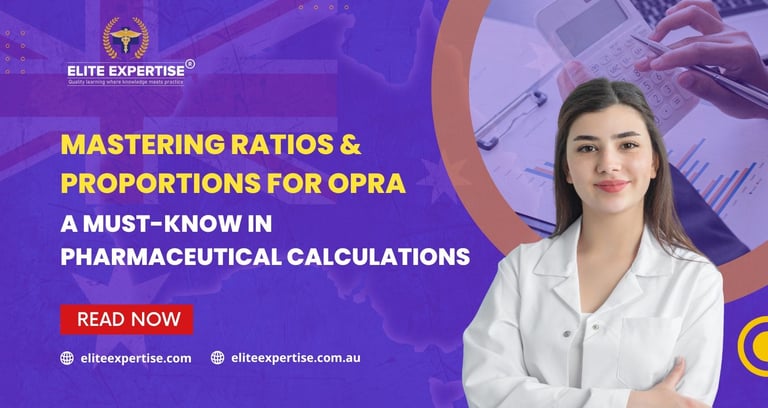ASK MY PHARMACIST | GOT QUESTIONS? Your pharmacist has answers. Click Here
Mastering Ratios & Proportions for OPRA: A Must-Know in Pharmaceutical Calculations
Prepare for the OPRA exam by understanding the ratios and proportions in the syllabus and help towards becoming a registered pharmacist in Australia.
Radhika
7/21/20255 min read


Preparing for the Overseas Pharmacist Readiness Assessment (OPRA) exam is an important step toward becoming a registered pharmacist in Australia.
The OPRA Exam is a multiple-choice, computer-based test that lasts 2.5 hours and contains a total of 120 questions.
If you're at the beginning of your Overseas Pharmacist Readiness Assessment (OPRA) exam preparation or just going through the main concepts, gaining confidence in ratios and proportions will help you not only during exam day but also in your future.
Learning the clinical sciences that are the basis of pharmaceutical calculations is particularly crucial for the OPRA test.
Eligibility and Registration
The Australian Pharmacy Council (APC) has established eligibility criteria that internationally trained pharmacists must meet. Ensure that you complete the registration period and submit your documents well in advance of the registration closing date. Early registration is recommended.
The required qualifications include a degree in pharmacy from an accredited university.
Candidates must select and complete the competency stream suitable for their background.
Eligibility must be confirmed before registering for the OPRA exam
Registration is done online through the APC Candidate Portal
The application requires uploading documents such as proof of qualifications and identity
Exam fee payment is part of the registration process
After submitting qualifications and required documentation, appear for the OPRA exam registration.
The broader registration process includes:
Register for the OPRA exam.
Once you clear the OPRA exam, apply for provisional registration with the Pharmacy Board of Australia (PharmBA).
Once you have completed provisional registration, proceed with supervised practice (internship). Complete supervised practice period of 1,575 hours, which is 12 months full-time.
After supervised practice hours, pass the board registration exams. These exams include the Australian intern written exam.
👉 Also Read: Australian Intern pharmacist-What is Australian intern oral exam
OPRA Exam Guide and Format
The OPRA exam is a computer-based, multiple-choice exam format.
Assesses knowledge in pharmaceutical sciences, clinical sciences, and biomedical sciences
Sample questions help understand question types and answering strategies.
The exam is held multiple times annually.
Candidates can select their preferred exam dates and locations, subject to seat availability.
Early selection is recommended due to the limited number of seats available.
What are Ratios and Proportions in the Overseas Pharmacist Readiness Assessment?
Here is how you can know about the ratios and proportions in the OPRA exam
Ratios represent comparisons between two amounts, indicating the proportion of one quantity to another (e.g., 2:5).
Proportions tell us that two ratios are equal. Thus, supposing 2:5 = 4:10, these numbers will be in proportion.
In the realm of pharmacy, these ideas are at the very heart of the activity of changing drug formulations, understanding prescription directions, and ensuring patient safety.
Why is it Important for OPRA Students?
The OPRA exam assesses a candidate's grasp of pharmaceutical sciences, clinical sciences, and biomedical sciences. Also, it ensures that all pharmacists in Australia have the necessary competence that complies with the safety standards for effective practice.
Preparing for the OPRA exam assesses a candidate's commitment to upholding Australian standards and delivering high-quality care to patients.
Ratios and proportions underpin many pharmaceutical calculations:
Calculating dosages based on weight or age
Diluting or compounding medications
Converting between different measurement systems
Adjusting concentrations of solutions
A clear grasp of these concepts is non-negotiable for anyone aiming to pass the OPRA exam and achieve the required pharmacist qualifications in Australia. OPRA exam coaching significantly increases the likelihood of passing the exam.
Types of Questions You Might See
Understanding the format and context is vital for OPRA exam preparation. Expert tips for managing time and tackling tricky questions are important for success in the Overseas Pharmacist Readiness Assessment exam.
Dosage calculations (e.g., mg/kg, body surface area)
Solution dilutions
Powder reconstitution
Infusion rates
Many questions are scenario-based, requiring application rather than rote memorization.
Common Mistakes to Avoid
Ignoring units or failing to convert them properly
Mixing up numerators and denominators
Overlooking decimal placement
Assuming ratios have to be simplified (sometimes, the format matters more)
Not double-checking the clinical context (e.g., pediatric vs. adult dosing)
Sample OPRA Questions
These examples are taken from the sample paper provided on the Australian Pharmacy Council (APC) website
A 30 kg child is to be administered 250 mg of metronidazole every 8 hours. Each milliliter of a 500 mg/500 mL ampule of metronidazole contains 0.135 millimoles/mL of sodium. What is the amount of sodium the child will receive in 24 hours?
A patient is prescribed Lugol's Solution (5% iodine) 0.3 mL three times a day. How much iodine does this provide each day?
An adult subject is injected with 100 mg of a drug, and the resultant plasma concentration is 2.5 microgram/mL. Assuming the drug uniformly distributes in body water, what is this subject's volume of body water?
Practicing these types helps clarify the application of ratios and proportions.
👉 Also Read: OPRA Exam Common Questions – Everything You Need to Know
Quick Recap & Study Tips
These are some tips you can follow for a successful exam day.
Understand, not just memorize—if you can, try to visualize problems.
Study using similar scenarios from real life to the OPRA exam format.
Apply dimensional analysis to eliminate calculation mistakes.
The use of electronic aids, such as flashcards, formula sheets, and cheat sheets, will facilitate interactive and more efficient preparation for the Overseas Pharmacist Readiness Assessment (OPRA) exam.
Practice timing yourself with questions to simulate exam conditions.
Post-Exam Process
Candidates who have taken the OPRA exam will be provided with exam results indicating whether they have a passing score.
Those who have cleared the examination can register provisionally with the Pharmacy Board of Australia and become an intern pharmacist in Australia.
If a candidate fails, they can still retake the exam. You can register to sit the exam again during the next exam period.
Candidates can access their exam scores through the candidate portal on the APC website.
Free Resources for Extra Practice
Elite Expertise offers sample OPRA exam free resources, quizzes, and downloadable guides tailored to Australian pharmacy exam standards.
The APC official website is also a valuable source for guidelines and examples.
Consider reviewing textbooks or open-access online modules focusing on pharmaceutical calculations.
Elite Expertise also conducts mock exams for OPRA exam preparation courses to gauge readiness.
👉 Also Read: How to Prepare for the OPRA Exam for Pharmacists in 3 Months
Conclusion
Confidence with ratios and proportions not just prepares you for the OPRA exam but is also integral to the safe and professional pharmacy practice in Australia.
A structured OPRA exam preparation course provides candidates with the knowledge and confidence needed for a first-time passing attempt.
Candidates who wish to register for the OPRA Exam must complete an eligibility check.
Suppose you want a structured OPRA exam preparation. In that case, Elite Expertise provides targeted support, resources, and expert guidance to help you succeed on your journey to becoming a registered pharmacist in Australia.
The information provided on this blog is for informational purposes only. While we strive to provide accurate and up-to-date information about the OPRA exam, the official resources from the Australian Pharmacy Council and the Pharmacy Board of Australia are the definitive sources of information.
⚠️ Disclaimer


About the Author
Radhika
Content Writer | Elite Expertise
Radhika loves all things content! With a Master's in English Literature and over 4 years of experience in digital strategies. She specializes in creating engaging content across diverse industries - including healthcare, technology, and e-commerce - always writing content that connects to its readers.
Follow On
Follow Us
+91 76750 84909
Privacy Policy | © 2025 Elite Expertise . All Rights Reserved.
ELITE EXPERTISE PTY. LTD (ABN: 15668292439) (ACN: 668292439)
Australian Statutory Education License: OPP 2025 ELITE EXPERTISE PTY. LTD
Disclaimer
Elite Expertise is an online education platform dedicated solely to providing coaching and preparation services for the OPRA, PEBC, PSI and PTE exams. We do not offer any sponsorship or migration services. All information provided on our platform is for educational purposes only and should not be interpreted as legal or immigration advice. For inquiries regarding sponsorship, visa applications, or migration services, please consult with licensed immigration professionals or relevant authorities.
Elite Expertise is a trusted and results-driven training platform specializing in preparation for international pharmacist licensing exams. Our comprehensive courses, expert instructors, and proven methodologies have helped countless pharmacy professionals achieve their goals and succeed in competitive regulatory exams. We are proud of our strong success rate and commitment to excellence.
Elite Expertise is an independent training provider. We are not affiliated with any global pharmacy regulatory authorities or official exam-conducting bodies.
Copyright © 2026 Elite Expertise. All rights reserved.
Address
Unit 1/73 Beverley St, Doncaster East VIC 3109, Australia
